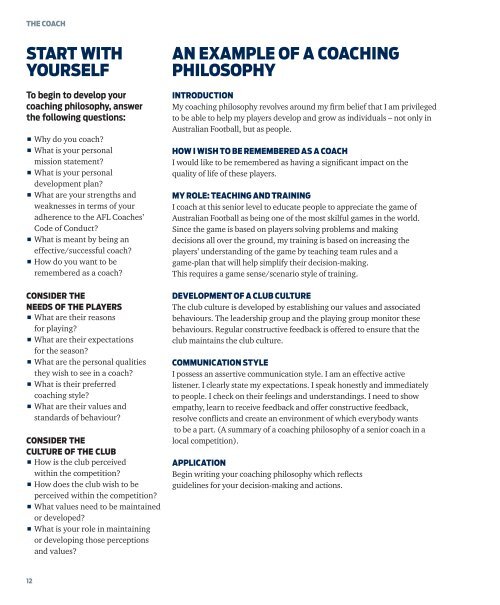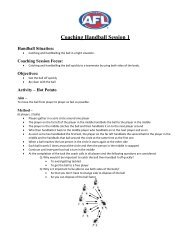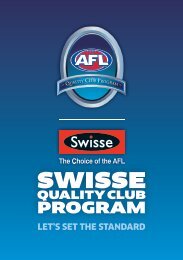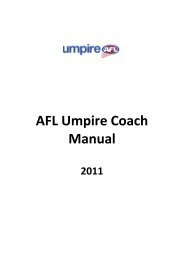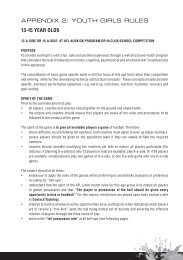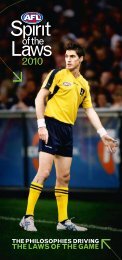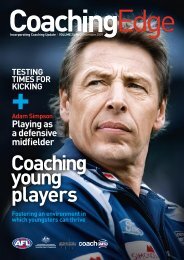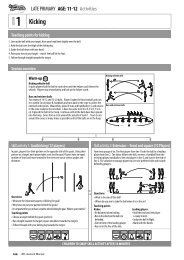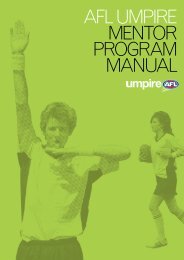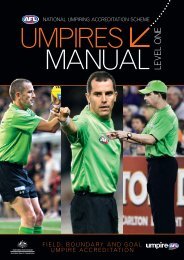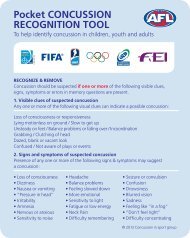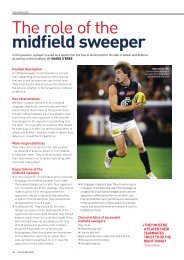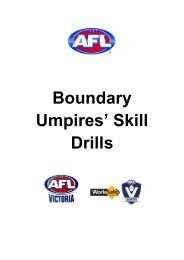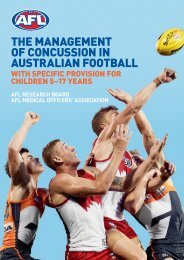AFL Coaching Manual - Western Bulldogs Football Club
AFL Coaching Manual - Western Bulldogs Football Club
AFL Coaching Manual - Western Bulldogs Football Club
You also want an ePaper? Increase the reach of your titles
YUMPU automatically turns print PDFs into web optimized ePapers that Google loves.
the coach<br />
chapter 1 – the role of the coach<br />
START WITH<br />
YOURSELF<br />
To begin to develop your<br />
coaching philosophy, answer<br />
the following questions:<br />
ppWhy do you coach?<br />
ppWhat is your personal<br />
mission statement?<br />
ppWhat is your personal<br />
development plan?<br />
ppWhat are your strengths and<br />
weaknesses in terms of your<br />
adherence to the <strong>AFL</strong> Coaches’<br />
Code of Conduct?<br />
ppWhat is meant by being an<br />
effective/successful coach?<br />
ppHow do you want to be<br />
remembered as a coach?<br />
Consider the<br />
needs of the players<br />
ppWhat are their reasons<br />
for playing?<br />
ppWhat are their expectations<br />
for the season?<br />
ppWhat are the personal qualities<br />
they wish to see in a coach?<br />
ppWhat is their preferred<br />
coaching style?<br />
ppWhat are their values and<br />
standards of behaviour?<br />
CONSIDER THE<br />
CULTURE OF THE CLUB<br />
ppHow is the club perceived<br />
within the competition?<br />
ppHow does the club wish to be<br />
perceived within the competition?<br />
ppWhat values need to be maintained<br />
or developed?<br />
ppWhat is your role in maintaining<br />
or developing those perceptions<br />
and values?<br />
AN EXAMPLE OF A COACHING<br />
PHILOSOPHY<br />
Introduction<br />
My coaching philosophy revolves around my firm belief that I am privileged<br />
to be able to help my players develop and grow as individuals – not only in<br />
Australian <strong>Football</strong>, but as people.<br />
How I Wish To Be Remembered as a Coach<br />
I would like to be remembered as having a significant impact on the<br />
quality of life of these players.<br />
My Role: Teaching and Training<br />
I coach at this senior level to educate people to appreciate the game of<br />
Australian <strong>Football</strong> as being one of the most skilful games in the world.<br />
Since the game is based on players solving problems and making<br />
decisions all over the ground, my training is based on increasing the<br />
players’ understanding of the game by teaching team rules and a<br />
game-plan that will help simplify their decision-making.<br />
This requires a game sense/scenario style of training.<br />
Development of a <strong>Club</strong> Culture<br />
The club culture is developed by establishing our values and associated<br />
behaviours. The leadership group and the playing group monitor these<br />
behaviours. Regular constructive feedback is offered to ensure that the<br />
club maintains the club culture.<br />
Communication Style<br />
I possess an assertive communication style. I am an effective active<br />
listener. I clearly state my expectations. I speak honestly and immediately<br />
to people. I check on their feelings and understandings. I need to show<br />
empathy, learn to receive feedback and offer constructive feedback,<br />
resolve conflicts and create an environment of which everybody wants<br />
to be a part. (A summary of a coaching philosophy of a senior coach in a<br />
local competition).<br />
APPLICATION<br />
Begin writing your coaching philosophy which reflects<br />
guidelines for your decision-making and actions.<br />
COACHING<br />
STYLES<br />
In a study of more than<br />
500 coaches, five distinct<br />
categories of coaching<br />
styles were identified.<br />
There is, however, no one perfect<br />
style that leads to success.<br />
Most coaches possess certain<br />
characteristics of each coaching<br />
type but should be aware of the<br />
advantages and disadvantages of<br />
the various coaching styles.<br />
If coaches are able to identify<br />
some of their shortcomings, they<br />
are in a position to improve.<br />
Authoritarian Coach<br />
Strong disciplinarian.<br />
Well organised.<br />
Good team spirit when winning.<br />
Dissension when losing.<br />
May be feared or disliked.<br />
Business-like Coach<br />
Intelligent, logical approach.<br />
Well planned and organised.<br />
Up to date with new techniques.<br />
Expects 100 per cent effort all the time.<br />
May set goals too high for some team members.<br />
Nice Guy Coach<br />
Well liked.<br />
Players sometimes take advantage of the coach’s co-operative nature.<br />
Gets on well with the players of similar temperament.<br />
Creates a supportive environment.<br />
Intense Coach<br />
Emphasises winning.<br />
High anxiety often transmitted to players.<br />
Easy-going Coach<br />
Very casual.<br />
Gives impression of not taking<br />
the game seriously.<br />
May not be prepared to drive<br />
the team at training.<br />
Well liked but may seem to be<br />
inadequate in some situations.<br />
APPLICATION<br />
1. Consider each of the coaching<br />
styles and their characteristics<br />
in the light of your personality<br />
and the age and ability of<br />
your team.<br />
2. Consider when you would use<br />
that style and those characteristics.<br />
FOOTBALLERS<br />
CAN BE DIVIDED<br />
INTO FOUR MAIN<br />
CATEGORIES<br />
ACCORDING TO<br />
THEIR SIZE AND AGE.<br />
1. Pre-<strong>Club</strong> (<strong>AFL</strong> Auskick)<br />
Up to 12 years<br />
2. Junior Player 8-12 years<br />
3. Youth Player 13-18 years<br />
4. Senior Player<br />
It is imperative that your<br />
coaching style and philosophy<br />
take into account the age and<br />
ability of your team.<br />
12<br />
13


